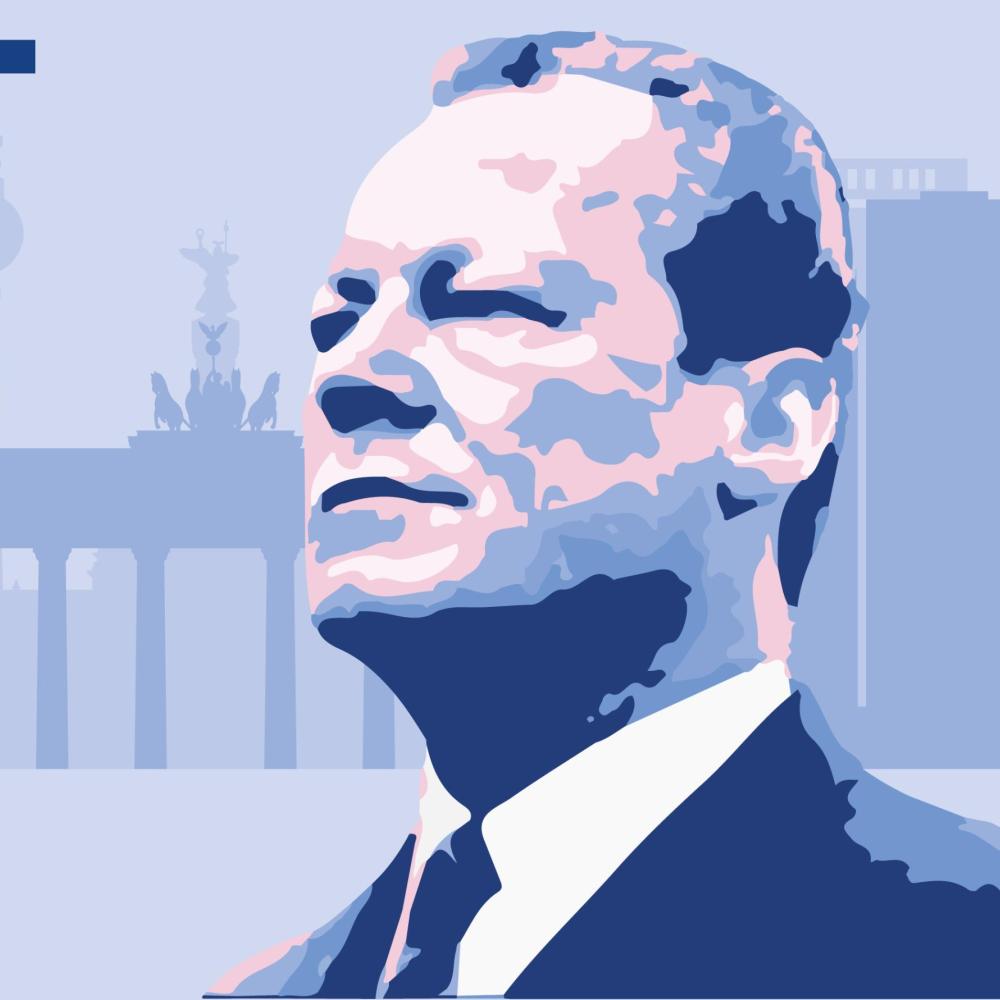

Willy BRANDT (°1913 - 1992)
Profession: Politician, Activist, Chancellor
Nationality: German
Why an honorary doctorate?
In 1990, a year before his death, Willy Brandt received an honorary doctorate from VUB for his dedication and achievements.
Social recognition
His social commitment continued to inspire many. His commitment united people and made them want to connect with each other: it was common knowledge that Brandt was open to compromise. He ruthlessly threw himself and his policies into the peaceful struggle to end the Cold War once and for all. It is in this context that VUB recognises parallels with Brandt, namely non-violent struggle for ideals that benefit the community as a whole.
It is true that peace is not necessarily the complete and only solution to everything. It is neither sanctifying nor can it be universally used to solve any problem. But it is a foundation, a righteous breeding ground in which humanity and social commitment thrive best. Peace may not be the answer to everything, but without it we also face what we never had in the first place.
"Peace is not everything, but without peace, everything is nothing."
About his career
Major prize
In 1971, Willy Brandt received the Nobel Peace Prize for his hard work in European political cooperation.
18 December 1913
Herbert Ernst Karl Frahm, later Willy Brandt, was born in Lübeck, Germany. It is Willy's grandfather who raises him. Brandt seeks the warmth of a close-knit family in social democratic youth movements.
Social democrat, avant la lettre
18 December 1913. Herbert Ernst Karl Frahm, later Willy Brandt, is born in Lübeck, Germany. His father is a one-day wonder and his mother has little time for the boy; it is Willy's grandfather who raises him. Brandt seeks the warmth of a close-knit family in social democratic youth movements.
At seventeen, Willy joins the radical Sozialistische Arbeiterpartei (SAP), a Marxist movement for young people and intellectuals. In 1933, Hitler takes power in Germany and it is during the secret, underground meetings of SAP that Willy Brandt becomes Willy Brandt. In the same year, Brandt goes to Norway to set up an international SAP support centre. To make a living, he works as a journalist for various newspapers.
The Germans invade Norway and Brandt chooses to run away to Sweden. He is impressed by the socialism of the Scandinavian labour parties and joins the Sozialdemokratische Partei Deutschlands (SPD).
1948. WWII has already pulled its tail in a bit and Brandt returns to Germany. He is admitted to the Bundestag, the parliament of the Federal Republic of Germany. The calendar reads 1957, when the citizens of Berlin elect Willy Brandt as mayor of their city. Four years later, he is allowed to call himself top candidate on the Social Democrat party list.
He is popular, Willy, but that medal also has a flip side. There is quite a lot of gossip about him. About his alcohol abuse, for example, and his affairs with women. And that he once fled Germany and has a child out of wedlock.
1966. Willy Brandt becomes Minister of Foreign Affairs Three years later, he is elected Chancellor of the Federal Republic of Germany (BRD). It is the highlight of his career. Together with politician Egon Bahr, he creates a Neue Ostpolitik and tries to harmonise relations with the Deutsche Demokratische Republik (GDR) and the Soviet Union.
It is in this capacity that Brandt, in 1970, makes his legendary genuflection at the Ghetto monument in Warsaw. It is an impressive gesture of sympathy for the millions of victims Nazi Germany had on its conscience in Poland. The image makes a deep impression worldwide.
1971. The Nobel Peace Prize gives him a human face forever. In the elections of '72, Willy Brandt steers his party to an unprecedented victory: the SPD outnumbers the Christlich-Demokratische Union Deutschlands and Christlich-Soziale Union (CDU/CSU) for the first time.
1974 brings less good news. Brandt's personal assistant, Gunter Guillaumme, turns out to be an East German spy and that immediately heralds the end of Willy's chancellorship. He resigns, deeply disappointed and stripped of any illusion.
Willy Brandt remains SPD Chairman until 1987, when he withdraws from politics. Yet it was he who uttered the memorable words after the fall of the Wall in 1989: "Now what belongs together will grow together."
On 8 October 1991 Brandt exchanges the here and now for the hereafter. He was a social democrat in heart and soul until his last moment.
Cover name
He was born Herbert Ernst Karl Frahm but from 1933 onwards he used Willy Brandt as his cover name.
Remarkable quote
"Banging your fist on the table too often is worse for your fist than for the table."
What is an honorary doctorate?
VUB has awarded honorary doctorates every year since 1978 to personalities from the most diverse backgrounds who have made a remarkable contribution to their field and to society. From this solemn moment of recognition, they bear the honorary title of Doctor Honoris Causa of VUB.